Ontario’s Literacy and Basic Skills (LBS) sector is emerging from two years of tremendous change; we need a system that recognizes and supports that transformation.
The pandemic forced everyone working in adult literacy to step in and fill a void, making changes and improvements that we had talked about for a very long time. We all moved through an extreme learning curve, incorporating new ways of doing things and tackling projects that previously seemed impossible. From online program delivery, digitizing learner records and files, online audits and much more, our field has developed countless new solutions, many of which are here to stay.
From our vantage point at AlphaPlus, we’ve witnessed you overcoming barriers and obstacles. You acted quickly to find ways to continue reaching and supporting learners. We see the hard work you’ve done to adapt, and we’re proud to have played a role in helping many of you.
New Ministry initiative taking place within an altered landscape
Last October, we started a discussion about a vision for system-level change for our sector. We introduced some of our thinking and our eight proposed strategies for improving the digital capacity of our adult literacy system, inviting you into the conversation. That same week, the Ministry of Labour, Training and Skills Development announced a new initiative.
The new Ministry initiative aims to identify gaps and priorities for digital services, and tools for learners, educators and organizations. They’re seeking input into creating a roadmap for enhancing the LBS system’s capacity to deliver more services remotely and expand blended learning opportunities to serve more learners.
You might recall that the Ministry conducted a program evaluation in 2016 that resulted in over 40 key recommendations — many of which have not been addressed. Today, our landscape bears little resemblance to what it looked like in 2016; we have to grapple with the changes we made during the pandemic and how we want to advance them.
As the Ministry starts to examine our new reality, they’ve asked AlphaPlus and Contact North|Contact Nord to help consult with educators, tutors, learners and organizations. We recognize you’re being consulted once again but we’re cautiously optimistic about what this could mean for our field as a whole. Now is an excellent time to provide insight into the problems that remain and the solutions we need. We want to help ensure that the right people are consulted and heard, and that good information gets into the hands of decision-makers.
This initiative is unfolding quickly, with multiple organizations playing a role. In addition to AlphaPlus and Contact North|Contact Nord, the project is working with the sector and stream organizations to organize participation in 13 small discussion groups over January and February. We’ve set up a home base to provide you with essential information, links and AlphaPlus updates.
While we work on the long-term change, we’re here to support you now
Working on the big picture and contributing to moving forward these long-term pieces — such as the eight strategies and capacity initiative — is a process that takes time. We know that you want us to participate in those discussions and advocate for the adult literacy sector, and we also know that you need support now.
While we play a role in big-picture vision-building, we continue to support the immediate needs of instructors and program administrators. In the last year, we’ve worked by your side through coaching, networks, offering tools and templates to help you digitize your course materials, and showcasing and sharing your innovations and successes.
As we kick off 2022, we’re excited about new opportunities to support you. For example:
- Our educator network is creating spaces for instructors to learn and explore together.
- In April, we’ll be opening a new round of coaching sessions for instructors and program administrators.
- Keep an eye out for the Wayfinders Studio. We spoke to educators who are exploring, experimenting, and reflecting on how digital technology can enhance learning in creative ways. We will launch the Studio in February to let you know what we learned.
- This spring, we’ll launch a completely new AlphaPlus website with a renewed focus on resource curation and knowledge exchange within a user-friendly experience.
The pandemic has forever altered the landscape for delivering adult literacy education. We’re here to help ensure that we hold on to our sector’s best innovations and continue on a positive trajectory forward.
If you have any questions about our role in the Ministry initiative or how the AlphaPlus team can support you directly, please email me at acherwinski@alphaplus.ca.
Alan Cherwinski
Executive Director
AlphaPlus
At AlphaPlus, we’re currently looking for perspectives that may have been missing in our inclusion efforts.
I’m the Executive Director of AlphaPlus, but I wear more than one hat in the adult literacy education field: I’m also on the board of a literacy program here in Picton, which allows me to engage in adult literacy work in an entirely different way.
Recently, during a board discussion about 2S-LGBTQ+ issues within the local program, I was struck by perspectives I had previously been missing. As we discussed disruptions to family life and school that can lead to a need for a literacy program down the road, I realized that, though gay myself, I had, as a white, cisgender male living with several privileges, been unaware of many LGBTQ issues affecting learning.
Since coming to that realization, and knowing that at AlphaPlus we tend to talk about equitable delivery but less about being intentionally inclusive by design, I have entered AlphaPlus into a partnership with Ontario Digital Literacy and Access Network (ODLAN), an organization that facilitates digital literacy and advocates for the removal of barriers to accessing online spaces for 2S-LGBTQ+ communities. ODLAN offers resources to help organizations build the infrastructure and capacity to concretely address these issues. This partnership allows us the opportunity to learn about aspects of digital equity from an organization outside the field of adult literacy. Through the ODLAN network, organizations can collaborate further on using an intersectional lens in developing digital strategies that will minimize the barriers 2S-LGBTQ+ communities are experiencing.
This initiative leads us to the following questions:
- Who else can we learn from and partner with?
- What other organizations and projects outside of the adult literacy space are leading the way in digital inclusion?
Creating sector-wide system change
One of AlphaPlus’ strategic priorities is building a more equitable and inclusive literacy and basic skills (LBS) system. We have identified eight strategies to address long-standing challenges and gaps – from affordable access, to infrastructure investments, to choosing performance measures that work for learners. We’ll be sharing our recommendations for sector-wide system change over the next few months.
The strategies were built upon an AlphaPlus vision of the digital learning opportunities an adult learning system must provide. The wording of the vision is a work in progress (you can read it here), and we believe our framing of digital opportunities can, with your help, be strengthened by a more careful examination of, and explicit commitment to, inclusion.
Seeking your input
As we work toward creating sector-wide change, we’d like to learn from you, our peers in the adult literacy sector. Can you help us to be more consciously inclusive and think about approaches to inclusion that we haven’t previously considered? Please share your insights, recommendations, examples, partner ideas. We would also welcome any answers you might have to the following questions:
- Who are the members of our communities that we’re not reaching?
- Are there other tangential inclusion perspectives that we’re still missing?
- Are you further ahead in this work than we are at AlphaPlus? What can we learn from your experiences with more inclusive program delivery, design and administration?
We recognize that we have more questions than answers, which is why I’m sharing them with you. I welcome your input and would like to hear from you directly, so please email me at acherwinski@alphaplus.ca to share your thoughts.
Thank you in advance for helping us to learn together.
Alan
Executive Director
AlphaPlus

Digital literacy is a tricky concept to pin down. It can mean many things to different organizations and people. Rather than interpret it with a static definition, we describe the more actionable consequences of an equitable, sustainable and effective adult learning system that provides learners with comprehensive digital literacy development opportunities.
To fully realize these opportunities, the same opportunities many take for granted, system-wide adjustments that address learners’ access to technology, integrated understandings of digital literacy and literacy in digital spaces, professional development and capacity-building, program infrastructure, service delivery design and accountability and performance measures need to be considered.
AFFORDABLE INTERNET AND THE RIGHT DEVICE
- A reliable and affordable home internet connection and the device learners need for diverse, interactive and tech-rich learning opportunities
- Initial digital literacy using their own devices (often a smartphone), and leveraging their device to support further learning
DIVERSE, RELEVANT AND WELL DESIGNED LEARNING EXPERIENCES
- Transferable digital skills and insights that enable online participation and safeguard privacy, security and one’s digital footprint
- Up-to-date and well-designed applications, platforms, tools and materials for enhanced learning opportunities with a focus on affordable options to support use outside and beyond the program
- An approach to blended learning that incorporates online and in person spaces where technology rich literacy and numeracy practices are developed; and paper-based practices are integrated, depending on purpose, individual preference and accessibility
- The regular use of assistive technologies and assistive features within applications to build a repertoire of communication strategies
- The use of interactive and multi-modal materials and applications informed by evidence-based pedagogy and individual relevance for technology rich learning experiences
INCLUSIVE PARTICIPATION AND REPRESENTATION
- Support in navigating fundamental services, businesses and institutions with online-only and online-first entry points; and understandings of the implications (both the benefits and potential negative impacts) of the interactions and transactions
- Inclusive participation and contributions in relevant online spaces for social, economic and civic purposes
- Engagement in public consultations, democratic forums and processes to ensure representation for themselves, families and communities.
See – Questioning our ideas about inclusion – and asking for your input
Evernote is a suite of Apps and products that “make modern life manageable, by letting you easily collect and find everything that matters.” Think of it as a digital file cabinet that stores your notes, links, resources, recipes, and anything else you might want to keep or refer to in the future. It can also be great for daily journals or as a task or project management system, even for writing fiction.
It is accessible from any device – you can access Evernote via a browser or desktop software on your computer or via Apps on your smartphones or tablets. You can even install Evernote Web Clipper to make it easier to “save anything you see online – including text, links and images – into your Evernote account with a single click.”
Many users rely on Evernote to simply manage their notes and links to interesting articles or websites, which they group together in Notebooks. Examples include organizing information like:
- research on specific topics (such as digital technology tools or school assignments)
- favourite songs
- recipes
- cottage or travel plans
- motivational quotes
- interesting images
- possible funding sources
- hobbies
- links to important websites
- home contractors and service providers
Here is Maria from AlphaPlus sharing how she is using Evernote and offering ideas on how Evernote could be used with students:
Another AlphaPlus staff member, Monika, also uses Evernote to store her information.
Here is an example of how Monika’s Digitally-enabled teacher Notebook looks:
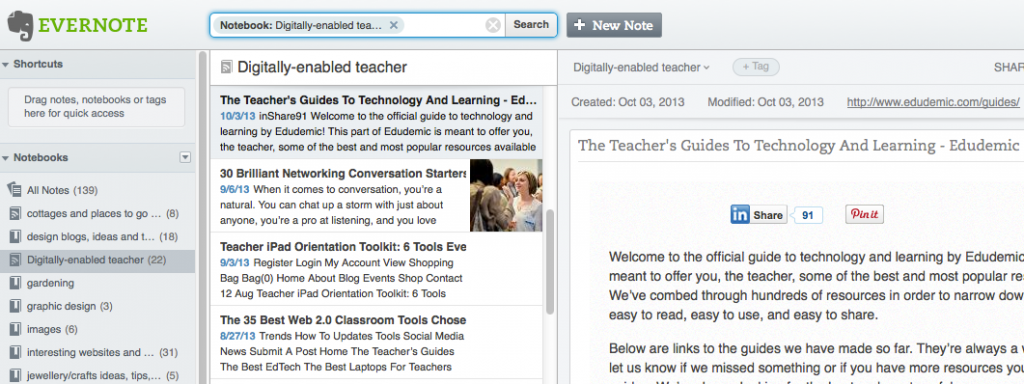
She uses it mostly to clip and organize various links and resources she finds online.
On the left, you will see various Notebooks (think of them as folders) that were set up to organize information. In the middle, you will see quick previews of the items stored within the digitally-enabled teacher Notebook. There are 22 items in total. On the right, you will see the details for the item selected and a preview of the actual web page or link that was saved.
Evernote even keeps information on when the item was saved and a link to the actual source of the page.
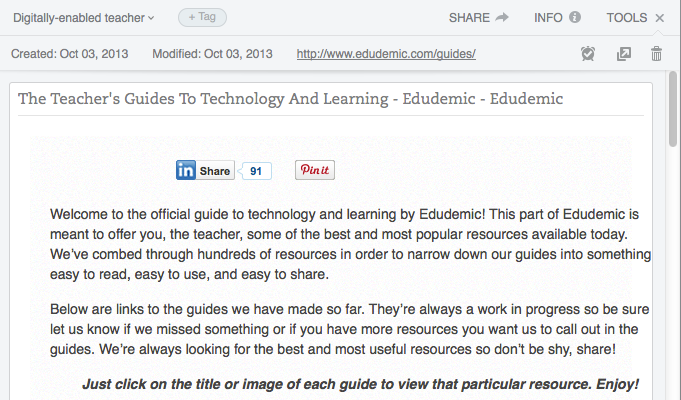
Just imagine how you could use Evernote to save all the information that’s important to you in one place and have access to it from any location at any time (either via your devices, your computer or a web browser).
You can also share your notes and Notebooks with others via a public link (no need to log in to view it) or by email (recipients will have to set up and/or log in to their Evernote to view it).
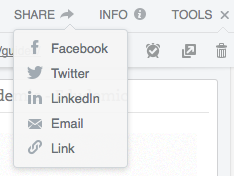
Evernote can be a great tool for administrators or educators to organize their tools, links and resources. For example, they can use it to save:
- interesting articles and websites
- how-to websites, manuals and guides they find useful
- links to activities they might want to use in the class
- videos and images
- interesting quotes
- special events
Students can use Evernote to manage their learning, organize their information and notes and develop their digital technology skills in the process.
For example, they can set up a Notebook (think of it as a folder) for their class. In this folder, they can store the link to their class website with class assignments and resources (if there is one), their teacher’s contact information, and possibly social media tools like Twitter or Facebook so they can quickly get in touch with the program or a teacher.
If students work on projects or online assignments, they can use Evernote to gather research on specific topics. With the Evernote Web Clipper, the process is even simpler. While doing their research online, they can click on the web clipper icon (they can install it in their browser) and follow a few steps to save the content to their Evernote account. They can also choose which Notebook they want to add the information to, and whether they want to simply save the URL, the article or the full page.
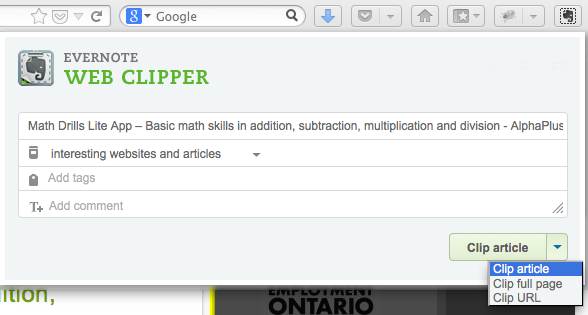
Students can also use Evernote to write notes, such as reminders, to-do lists, outlines, daily journals, meeting/class notes, and project timelines. Here is a quick example of a note a student can create while working on an assignment. The notes can be formatted (bullets, underline, etc), and even include attachments (if the assignment was provided to the student in electronic format, they can attach it to their notes as well).
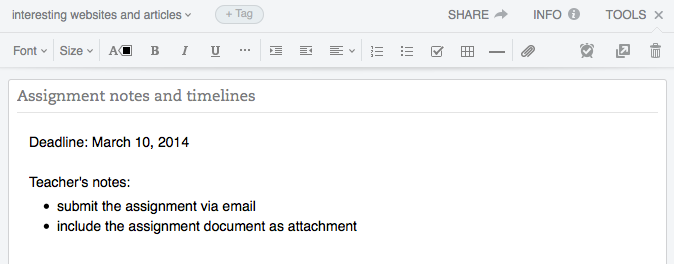
Introducing students to Evernote can be a great way to help them manage their learning and to teach them technology and organizational skills.
Maybe students could even use Evernote as their personal portfolio or to work on and manage their training plans. What do you think?
Additional links and resources:
Evernote Guide
Evernote for business
What’s All the Fuss About Evernote? Should I Be Using It?